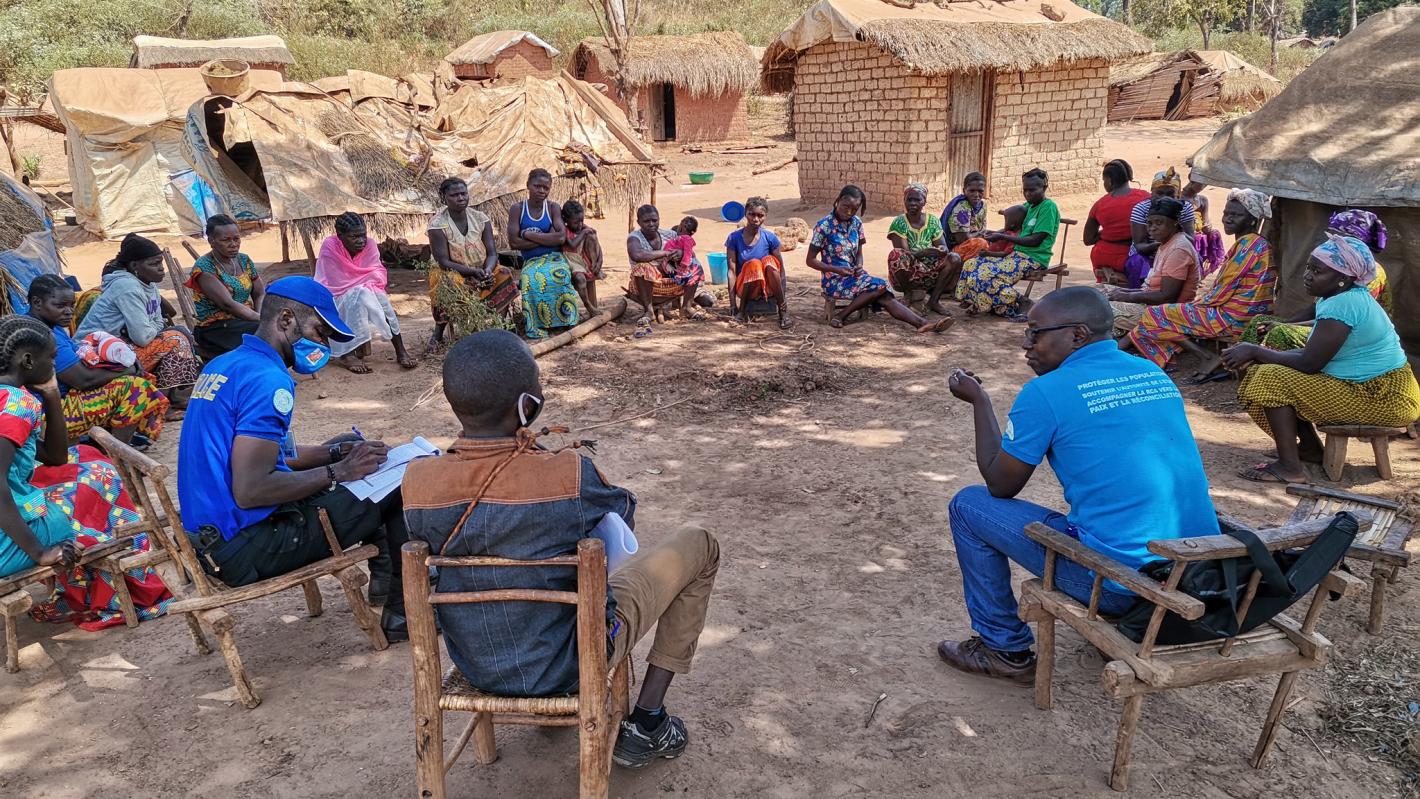
Civil Affairs at a Glance
The Civil Affairs team within MINUSCA focuses on bringing a bottom-up and top-down effort to engage communities, and acts as a link between the Mission, the United Nations Country Team, central government, local authorities, civil society, and vulnerable communities in remote parts of the Central African territory. With a team of 117 staff present in the 12 field offices, including Bangui, and 40 other locations where the Force is deployed, the Civil Affairs Section plays a critical role in the areas of Protection of Civilians, Dialogue and Reconciliation and the Restauration of State Authority. In addition, Civil Affairs manages the implementation of Quick Impact Projects (QIPs) under the supervision of the DSRSG-RC/HC and the SRSG’s authority, on behalf of the entire Mission.
One of Civil Affairs’ key roles is to engage with communities and develop local networks and strategic partnerships, ensuring that the Mission has access to information and early warning about conflict dynamics, as well as gauging and responding to local perceptions and expectations in regard to the political process, including the APPR (Accord Politique pour la Paix et la Reconciliation, signed on 6 February 2019) peace process, and the implementation of the “Dialogue Republican’s” main recommendations. As such, Civil Affairs has three main areas of work, as follows:
- Protection and community liaison: liaison with authorities and communities regarding their protection needs, facilitating the establishment of alert networks and protection plans as well as enhancing MINUSCA’s capacity to prevent and respond to security threats.
- Community dialogue and social cohesion: a focus on strengthening social cohesion, support to local peace processes and conflict resolution, providing support to civil society organizations (including youth, women, religious and traditional platforms) and confidence-building mechanisms through outreach activities.
- Restoration of state authority: support to the deployment of territorial administration and restoration of state authority, preservation of territorial integrity, and strengthening of basic administrative and social services delivery at the local level in collaboration with the UNCT.
Strategic Objectives
Civil Affairs’ strategic priorities, conveyed by communities, cut across Civil Affairs programmatic components: Dialogue and Reconciliation, Protection of Civilians, and Restoration of State Authority. Civil Affairs works specifically to:
- Promote peaceful transhumance by strengthening transhumance conflict prevention mechanisms in transhumance hotspot locations.
- Revitalize Early Warning and Response mechanisms (Community Alert Networks) and strengthen collaboration between CLAs and the Force in preventing and mitigating threats against civilian populations.
- Broker local peace agreements to build and strengthen social cohesion in communities.
- Facilitate the return of internally displaced persons and refugees under the leadership of humanitarian actors and the restoration of freedom of movements.
- Enhance reconciliation and community dialogue initiatives to improve confidence for APPR-RCA, support local peace processes and social cohesion and stability within communities.
- Improve the presence and functioning of the public administration system and delivery of essential social services in coordination with and support to the UNCT within the framework of decentralization and the upcoming local elections.
- Support the Government in fighting the spread of COVID-19.
Activities
Civil Affairs activities include:
Enhancing Early Warning and Response mechanisms for the protection of civilians, with the Community Liaison Assistants (CLA) program as its cornerstone. CLAs serve as the interface between authorities, communities and the MINUSCA Force, particularly in the context of communicating the protection needs and concerns of communities. A strong and fruitful collaboration between uniformed components and communities will mitigate security risks and protect civilians against threats especially from armed groups. Additionally, Civil Affairs oversees the elaboration of Community Protection Plans, intended to provide a strategic overview of protection needs and mitigation practices in a given area, and the strength of Community Alert Networks, intended to enhance mechanisms for Early Warning and Response for communities at risk.
Providing support to the establishment of conflict-management mechanisms to encourage activities in the areas of community dialogue, reconciliation, and peace consolidation. Civil Affairs is supporting the implementation of the existing 11 local peace agreements and is addressing new local peace and dialogue challenges in hotspot areas through the implementation of income-generating activities, and incentives to promote the return of IDPs, freedom of movement, the reduction of tensions among Muslim and Christian communities, the prevention of violence related to transhumance, equal access to social and administrative services and peaceful coexistence. CAS approach includes a specific focus on women and youth as active stakeholders in the peace process, through local mediation and conflict resolution mechanisms.
Supporting the restoration of state authority at the local level to increase access to administrative and social services, as well as measures promoting transparency and accountability. Key and immediate Civil Affairs tasks include the facilitation of logistical support for the deployment of civil servants, the basic rehabilitation and equipping of administrative offices, and capacity building of redeployed personnel. Moving forward, the broader MINUSCA strategy for the restoration of State authority will require increased coordination and integration of programming at the Prime Minister’s Office level and across the Ministry of Territorial Administration (MATDL), MINUSCA, UN Country Team, and other partners, to support the decentralization process across the country and the effective functioning of locally elected authorities in view of the upcoming local elections.


